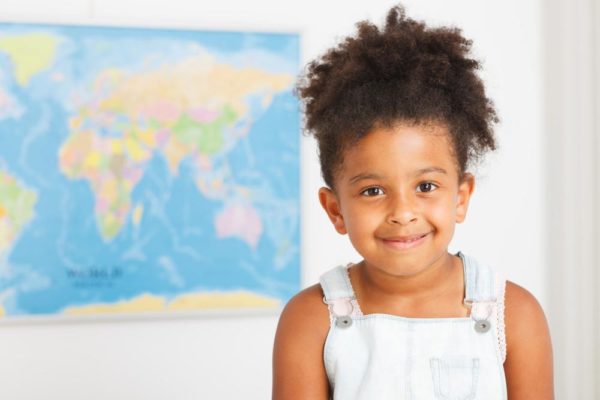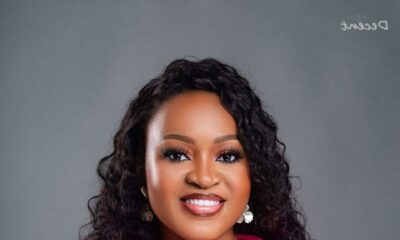Features
Bim Ehi: 6 Tips to Help Choose a Good Creche or Pre-School for Your Child
 Modern parents, many of us will agree that trying to choose that first school for your first born was not an easy task.
Modern parents, many of us will agree that trying to choose that first school for your first born was not an easy task.
At the beginning of the search, you have many factors to consider: cost, close to home or close to work, Montessori, academic or other learning styles, a big school that has primary or just a small creche?
The options are many and if you allow it, the search can take a long time.
That’s why I have put together six tips to help you find that first child-care center for your child. Not just any center, but one that is high-quality.
Your money should be well spent (we pay a lot these days); your child should also be allowed to grow and thrive there. The early education experts are telling us that the first 5 years of a child’s life are so important and can shape a child’s future. It is worth choosing carefully!
If you choose a high-quality school and your child spends a few hours a day there, your child will be well on their way to building a solid foundation for their successful future.
A high-quality pre-school should offer:
1. Variety of play – pretend play, physical development activities, pretend play, game with rules, arts & crafts. Some of this play should be outside and unstructured play (the children choose what they want to play with and decide how they will play with the objects).
2. Opportunities to practice turn-taking, sharing and collaborating with their peers
3. Opportunities to practice self-care and tasks that encourage their independence
4. An environment that nurtures their language skills and grows their vocabulary
5. And I believe, care-givers should have a positive relationship with the children and it should be fun!
Parents should also have the peace of mind of knowing that your child is growing confident, is safe, learning, developing and happy.
Let’s look at the six tips to help you choose that high-quality crèche/preschool:
Look for play-based learning
Question: Does the teacher talk about play? Did the teacher emphasize that rather than teaching the children, the children will be playing?
I have to admit that I am biased on this one, as I co-run a play-focus mum & baby club – POPP Lagos. Still, the early education experts have done the research and I have seen the advantages for myself over the last 2 years, so I truly believe play is enough to provide learning for their age (0 – 5).
You may be thinking, what about Montessori? Montessori is not the same as pure play-based learning. I personally believe a good montessori pre-school will incorporate play and a good play-based center, and will incorporate some of that wonderfulness of Maria Montessori’s philosophy, too.
The opposite of play-based learning, is pure formal academics; picture a teacher at blackboard drilling abc, 1-100 into your child and telling them to repeat after them. It involves rote learning and many experts agree, it is not the best thing for a small child (or even an older child – but that’s a discussion for another day).
Even if child A, does learn to recite 1 – 100 earlier than child B through rote learning, it does not make him smarter than child B. Child B will go on to learn it at an older age. While child B is playing in the early years, he is gaining an understanding, he is exploring and practicing for, rather than just hearing and repeating the words he is told by teacher. Child B is also gaining enthusiasm and a love for learning.
Tips: The best tip is to observe the day care or pre-school in its normal state. What are the children doing? Also just ask straight up – what is a schedule for a typical day at the centre and listen to what is said for clues about academic learning or play.
Seek for examples of individualized learning
Question: Does the teacher talk about following each child’s interests and abilities, aside from their regular daily schedule for the children?
When you see two 30 month olds, what they can do cognitively (completing puzzles for example), speech wise and even their social interactions, will be different. One child might be quite talkative, telling stories, another might be able to identify 1 – 10 and love puzzles, but not yet speak in full sentences.The school/crèche carers should be aware of this and adapting materials and interactions with children, daily, based on what they know about each child.
Tips: You can ask what they do if your child doesn’t want to join a certain group activity. You want to hear clues that they would bring out something your child enjoys doing and let him/her do that instead. They should talk about it as though, it is something that happens regularly and they don’t consider ‘wrong’ or ‘bad’ behaviour. If you see it in practice, while you are visiting – even better.
Is there time for free play?
Question: Are there times set aside in the day when the children get to choose what they play with? For how long?
During free play, children get to interact with each other freely and usually this is when they practice collaborating, sharing, waiting your turn. It’s also when they interact – which may just look like talking to or touching each other’s face, depending on the child’s age. Children are in control during free play and are able to act without instructions and may give you more clues as to what their interests are based on what materials they choose to play with.
Tips: Ask how long the children play outside in the playground for, everyday? Outside play is an important part of young children’s development and also constitutes free-play, since the children pick what they want to play on/with. You want to hear about different times in the day there is free play, both indoor or outdoors.
Is the class size adequate? Are classroom materials adequate?
Question: How big the class is – is it spacious? How many children are in the class? How many are under the care of one teacher/carer? What kinds of materials are in the classroom?
In terms of how many adults are watching a child, the younger the children, the fewer the children to one teacher/carer should be. So for babies 0 -15months, you wouldn’t want to see more 4 children to one adult-carer, and there should be only maximum, 8-10 children in one room.
Tips: You want to see shelves or cupboards with different learning material and toys. Look for art materials, music instruments, puzzles, pretend play materials (dolls, dress up costumes, toy kitchen). Is the room bright, airy, and spacious enough for the kids to ‘spread out’ in? I personally do not like to see children watching TV – so, seeing a TV in the room would be a red flag for me.
Are you happy with the teacher’s style and knowledge?
Question: What is the teacher’s personality and behaviour as he/she interacts with other teachers and the children? Is the teacher responsive, warm? Are they using an understanding tone when a child does something different from what is expected? What about the teacher’s credentials and experience? Does he/she have knowledge of child development for the age of the children in their care?
Tips: I personally recommend talking to the teacher who will be in the classroom with your child and directing questions to that person, rather than a tour guide or head teacher, who may have all the ‘right’ answers.
The teacher is closer to the everyday happenings in the classroom and they will be in close interaction with your child. You can also get a feel for their English language skills (does it match what you expect for the school fees you’re paying?), and gauge whether there is warmth and passion for the job.
If you take your child with you when you visit the school, you can also observe how teacher talks to your child.
Are you comfortable with the school policies?
Question: how does the school handle discipline? Do they smack (it would be a ‘no no’ for many of us) or have a time out chair?
Tips: Ask for examples of when they use these methods and do they inform you the parent when an incident has occurred and discipline has been meted?
Ask about sharing policy. You should be looking for something that teaches the children to wait their turn but also respects that if a child has something first, they should be able to play with it for some time before they have to give it up.
Then other key ones: do they conduct fire drills or have a plan for that, how about security, how do they make sure your child stays safe/isn’t picked up by a stranger?
Now, you may not need to ask all these questions to know that a school is quality and right for you, but it is a question template you can keep in mind for your first school visit! Is it not better to set the bar high within your fees range, to help you make the right choice?
One last thing, what ultimately makes a school the right one for you, above any lists, is that you feel confident in the teachers’/carers’ abilities and there is transparency and openness in the schools communication with you. These two things may help you believe your young child will be comfortable, happy and thrive there.
Make you make your list of schools to visit, do add the schools your friends children go to and prestigious schools, but remember that they may not suit you and your family. You may be surprised at which school you end up loving in the end.
Parents, which of these points is most important for you; as in, I must see this at the school? Also, any other key considerations you would add for finding a quality school/crèche, from your experiences?
Photo Credit: Oksana Amelin | Dreamstime




















